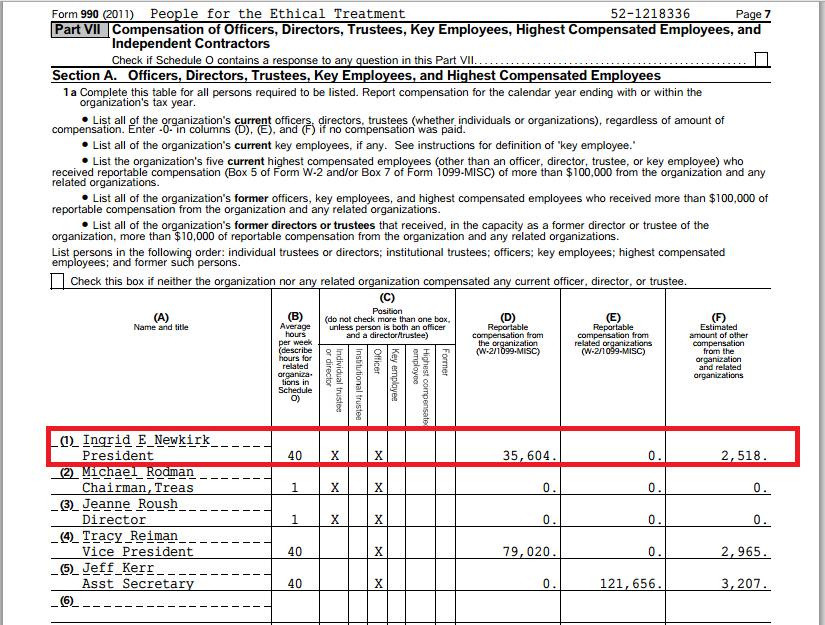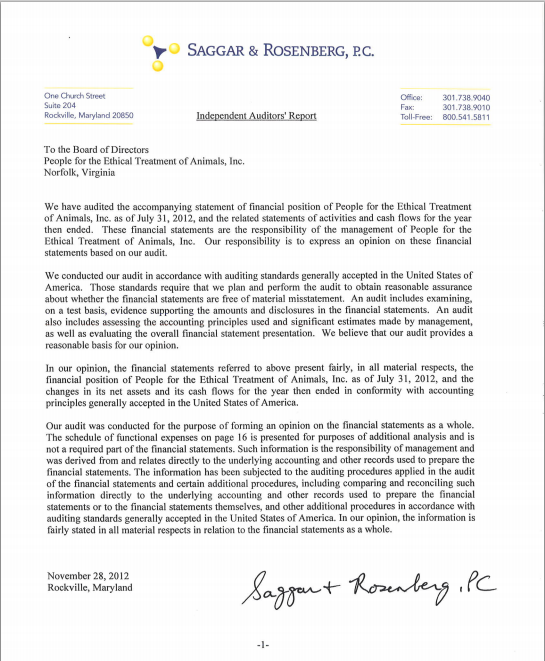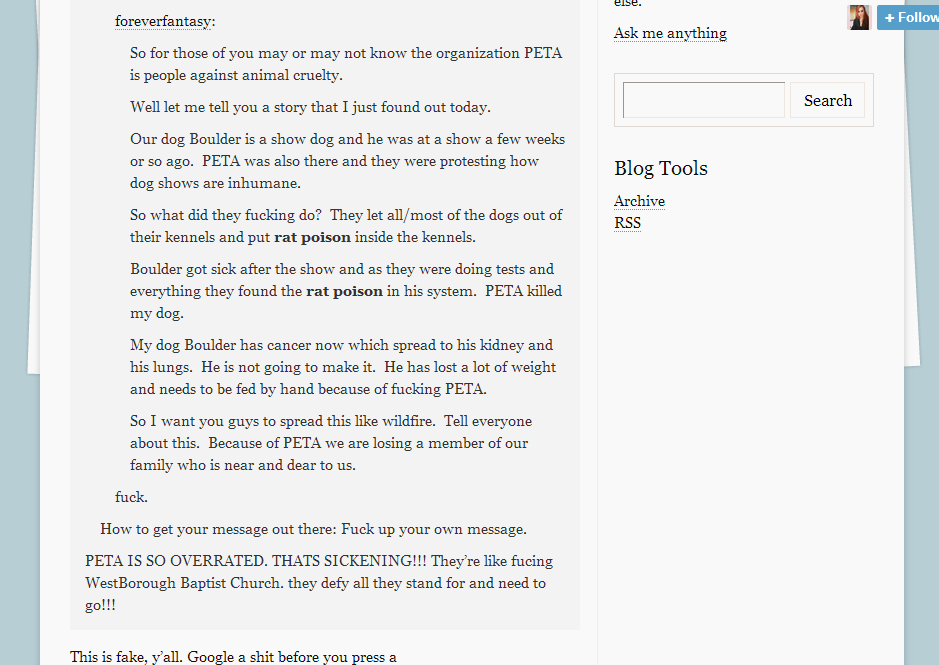"But, I Read It on the Internet."
 Photo Credit: Humane Society of the United States
Photo Credit: Humane Society of the United States
Any number of "PETA Kills Animals" articles and press releases are but a search engine query away. It turns out, there are several really good reason for that.
The Center for Consumer Freedom is managed by Rick Berman's public relations firm, Berman and Company, a Washington-based research and communications firm which prides itself on its media relations savvy.
So what do public relations firms do for their clients? According to Forbes, "A good agency or PR practitioner can analyze the organization, find the positive messages and translate those messages into positive media stories. When the news is bad, an agency can formulate the best response and mitigate the damage. An agency is a good listener to the marketplace and knows what conversation starters will work, but also what just might catch fire."
Public relations firms start conversations, either about their clients or about their clients' adversaries, and they do it by way of writing and distributing press releases, and writing pitches and sending them directly to journalists. Public relations firms cultivate relationships with many different journalists to make sure their campaigns are received by a broad audience. Since journalists don't actually work for the public relations firms, their articles appear to have an unbiased "outsider view," even though, behind the scenes, they're often working closely with the public relations firms to disseminate a very specific message. Public relations firms also specialize in crisis management strategies and develop counter campaigns to mitigate any damage their clients' critics might do to their reputations.
Distorting the Facts
According to Michael Kranish of the Boston Globe, there's a growing market for public relations firms that are willing to bend the debate in the direction that most benefits their clients, even if it means distorting the truth. In this realm, Richard Berman has one of the most successful enterprises in the field:
The Center for Consumer Freedom is managed by Rick Berman's public relations firm, Berman and Company, a Washington-based research and communications firm which prides itself on its media relations savvy.
So what do public relations firms do for their clients? According to Forbes, "A good agency or PR practitioner can analyze the organization, find the positive messages and translate those messages into positive media stories. When the news is bad, an agency can formulate the best response and mitigate the damage. An agency is a good listener to the marketplace and knows what conversation starters will work, but also what just might catch fire."
Public relations firms start conversations, either about their clients or about their clients' adversaries, and they do it by way of writing and distributing press releases, and writing pitches and sending them directly to journalists. Public relations firms cultivate relationships with many different journalists to make sure their campaigns are received by a broad audience. Since journalists don't actually work for the public relations firms, their articles appear to have an unbiased "outsider view," even though, behind the scenes, they're often working closely with the public relations firms to disseminate a very specific message. Public relations firms also specialize in crisis management strategies and develop counter campaigns to mitigate any damage their clients' critics might do to their reputations.
Distorting the Facts
According to Michael Kranish of the Boston Globe, there's a growing market for public relations firms that are willing to bend the debate in the direction that most benefits their clients, even if it means distorting the truth. In this realm, Richard Berman has one of the most successful enterprises in the field:
"Indeed, from the upper reaches of the Washington power structure on down, questionable or outright false statements have become a way of doing business. Hyperbole and distortion are common, a carryover from the rhetorical free-for-all of political campaigns; the result is that there is much public confusion about the issues, about what is fact and what is merely an interested parties claim."--Michael Kranish, Boston Globe
And, of course, Richard Berman has had a lot of help. By all accounts, the Center for Consumer Freedom's former Director of Research, David Martosko, created the "PETA Kills Animals" phenomenon, and has worked very hard over the years to keep the campaign's momentum going. On behalf of the Center for Consumer Freedom and its animal enterprise donor base, David Martosko has done some pretty unscrupulous things to undermine the animal rights movement.
The Man Who Cried "Terrorist"
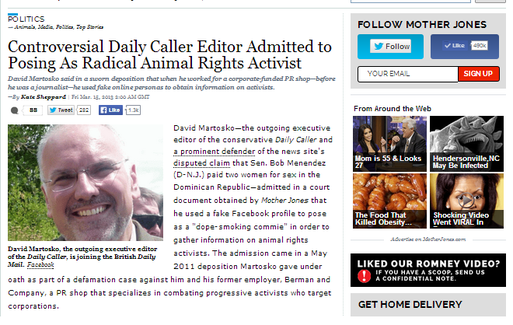 Image Courtesy of Mother Jones
Image Courtesy of Mother Jones
"Shortly after Thanksgiving 2008, we received an email from the Humane League of Philadelphia purporting to be a--an invitation to a holiday party at which a Vice President of the Humane Society of the United States was scheduled to deliver some sort of keynote address, and given my extensive research background into the animal rights movement, the juxtaposition struck me as rather outrageous and we decided that this specific instance deserved some public comment."--David Martosko
In 2008, in response to the Humane League of Philadelphia's fundraiser announcement he referred to in the above statement, David Martosko took out an ad in the New York Times asking the question, "Why Is the Humane Society of the United States Helping a Terrorist Group Raise Money?" Another part of the ad intimated that Nicholas Cooney, the leader of Humane League of Philadelphia, had "threatened the child of an employee of a pharmaceutical company that works with an animal-testing lab." Martosko claimed that the Humane League of Philadelphia's alleged former association with an animal rights group whose members had been imprisoned under the Animal Enterprise Protection Act, had been the impetus for the campaign. A defamation lawsuit resulted from the ad. The Humane League of Philadelphia sued Berman and Company, the Center for Consumer Freedom, Richard Berman, David Martosko, and the New York Times for libel. The New York Times was subsequently dropped from the lawsuit, but the litigation moved on for the other defendants. A deposition Martosko gave in relation to the lawsuit, revealed details about the shocking lengths Martosko would go to to undermine the animal rights movement.
During the deposition, Martosko revealed that he often posed as an animal rights activist in online forums with the purpose of gathering intelligence on actual animal rights activists, and that his shady activities didn't stop there. Martosko wouldn't deny that he endeavored to incite activists to commit acts of violence in retaliation for the egregious animal abuse committed against calves at an Ohio organic dairy enterprise. Had Martosko been successful in provoking an attack against the dairy, he would have effectively changed the conversation from one that might potentially effect dairy industry profit margins, to one where animal rights activists were portrayed as dangerous and violent "terrorists." None of the animal rights activists took the bait. It's been discovered that Martosko used his animal rights activist personas for other activities as well, also on behalf of the Center for Consumer Freedom. As early as 2001, Martosko used this ploy to introduce the Center for Consumer Freedom's deceptive anti-animal propaganda to the animal rights community, hoping his "activist" cache would lend it an air of credibility:
In 2008, in response to the Humane League of Philadelphia's fundraiser announcement he referred to in the above statement, David Martosko took out an ad in the New York Times asking the question, "Why Is the Humane Society of the United States Helping a Terrorist Group Raise Money?" Another part of the ad intimated that Nicholas Cooney, the leader of Humane League of Philadelphia, had "threatened the child of an employee of a pharmaceutical company that works with an animal-testing lab." Martosko claimed that the Humane League of Philadelphia's alleged former association with an animal rights group whose members had been imprisoned under the Animal Enterprise Protection Act, had been the impetus for the campaign. A defamation lawsuit resulted from the ad. The Humane League of Philadelphia sued Berman and Company, the Center for Consumer Freedom, Richard Berman, David Martosko, and the New York Times for libel. The New York Times was subsequently dropped from the lawsuit, but the litigation moved on for the other defendants. A deposition Martosko gave in relation to the lawsuit, revealed details about the shocking lengths Martosko would go to to undermine the animal rights movement.
During the deposition, Martosko revealed that he often posed as an animal rights activist in online forums with the purpose of gathering intelligence on actual animal rights activists, and that his shady activities didn't stop there. Martosko wouldn't deny that he endeavored to incite activists to commit acts of violence in retaliation for the egregious animal abuse committed against calves at an Ohio organic dairy enterprise. Had Martosko been successful in provoking an attack against the dairy, he would have effectively changed the conversation from one that might potentially effect dairy industry profit margins, to one where animal rights activists were portrayed as dangerous and violent "terrorists." None of the animal rights activists took the bait. It's been discovered that Martosko used his animal rights activist personas for other activities as well, also on behalf of the Center for Consumer Freedom. As early as 2001, Martosko used this ploy to introduce the Center for Consumer Freedom's deceptive anti-animal propaganda to the animal rights community, hoping his "activist" cache would lend it an air of credibility:
"The Facebook profiles don't appear to be first time Martosko used the Gregory Davis persona online. Mother Jones was able to find comments dating back to 2001 on anarchist and animal rights web forums from a commenter using the email address linked to the Facebook profile. In one instance, Davis posted a USA Today column by Martosko's boss, Richard Berman, and solicited activists' 'thoughts.'"--Mother Jones
Attempting to undermine the animal protection movement by labeling animal rights activists "terrorists," is a card that Martosko plays with some regularity. In 2005, as part of his ever-growing anti-PETA campaign, Martosko gave testimony before the United States Senate regarding "activity" the Center for Consumer Freedom believed implicated PETA in "environmental and animal-rights terrorism." The United States Department of Justice subsequently released a report clearing PETA of any wrong-doing, after a long and thorough investigation. Martosko's claims had been utterly baseless.
As Executive Editor of the Daily Caller, David Martosko wrote and published "PETA Kills Animals" articles--using the Center for Consumer Freedom as a source--without disclosing that it was he who created the anti-PETA campaign on behalf of the Center for Consumer Freedom
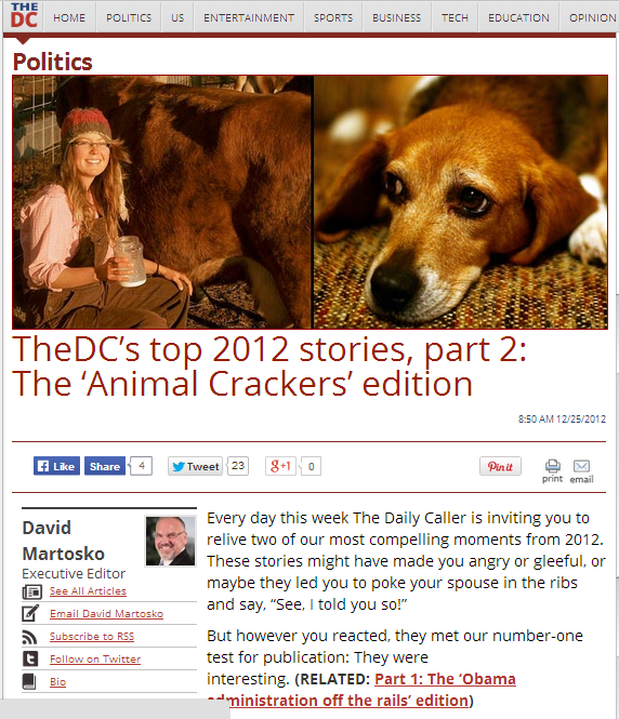 Click on Image to Read the Entire Article
Click on Image to Read the Entire Article
"Activists in the animal rights movement have spent decades posing as everything from medical lab workers to farmhands—both online and in person—in order to gather information about their investigative targets. That tactic is their bread and butter. So it should be unremarkable that many researchers would turn the tables on them in order to collect information. Law enforcement infiltrates the violent wing of the movement on a regular basis as well. As the saying goes, what's good for the goose..."--David Martosko
But David Martosko doesn't just use unscrupulous methods to gather information, he uses underhanded methods to disseminate the Center for Consumer's disinformation campaigns as well.
As Executive Editor of the Daily Caller, David Martosko wrote and published "PETA Kills Animals" articles, using the Center for Consumer Freedom as a source, and he did it without disclosing that it was he who created the anti-PETA campaign on behalf of the Center for Consumer Freedom in the first place. While at the Daily Caller, Martosko came under fire for his penchant for distorting the facts. It's believed that character flaw cost him his job there:
But David Martosko doesn't just use unscrupulous methods to gather information, he uses underhanded methods to disseminate the Center for Consumer's disinformation campaigns as well.
As Executive Editor of the Daily Caller, David Martosko wrote and published "PETA Kills Animals" articles, using the Center for Consumer Freedom as a source, and he did it without disclosing that it was he who created the anti-PETA campaign on behalf of the Center for Consumer Freedom in the first place. While at the Daily Caller, Martosko came under fire for his penchant for distorting the facts. It's believed that character flaw cost him his job there:
"Martosko, who announced recently that he is leaving the Caller to become the US political editor for the UK-based Daily Mail, has been involved in several controversies during his short career in journalism. Most recently, Martosko defended the Daily Caller's reporting on two Dominican women who claimed that they were paid to have sex with Menendez—allegations Menendez has repeatedly denied. Earlier this month, the Washington Post reported that one of the women came forward to say that she had in fact never met Menendez and had been paid to make false allegations. (The Caller claims that she was not one of the two women that it had interviewed.)"--Kate Sheppard, Mother Jones
"Martosko also drew negative press in September 2011 when he insisted that a Daily Caller report claiming the Environmental Protection Agency planned to hire 230,000 employees to enforce greenhouse gas regulations was legitimate, even as numerous outlets criticized theDaily Caller for inaccurate reporting."--Kate Sheppard, Mother Jones
David Martosko Subsequently Took A Position as Editor of the Daily Mail, Allowing Him to Keep the "PETA Kills Animals" Momentum Going
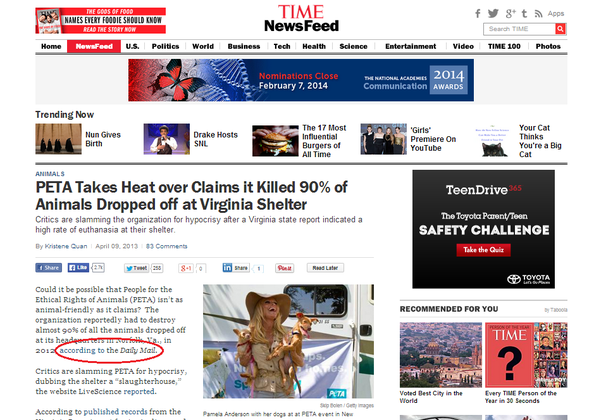 Click on Image to Read Entire Article
Click on Image to Read Entire Article
And it should come to no one's surprise that David Martosko isn't disclosing to Daily Mail readers that his past work history includes a decade-long stint at the Center for Consumer Freedom, creating some of the "public relations" campaigns the Daily Mail publishes as "news." The artifact of which has far-reaching implications.
In this example, a journalist writing for Time, is linking to a "PETA Kills Animals" article in the Daily Mail, and neither Time's readers or the Daily Mail's readers have been made aware that the Political Editor of the Daily Mail created the "PETA Kills Animals" campaign while employed as a public relations operative for the Center for Consumer Freedom.
David Martosko's former affiliation with the Center for Consumer Freedom and ties with the "PETA Kills Animals" campaign is conspicuously absent from his Twitter account as well.
In this example, a journalist writing for Time, is linking to a "PETA Kills Animals" article in the Daily Mail, and neither Time's readers or the Daily Mail's readers have been made aware that the Political Editor of the Daily Mail created the "PETA Kills Animals" campaign while employed as a public relations operative for the Center for Consumer Freedom.
David Martosko's former affiliation with the Center for Consumer Freedom and ties with the "PETA Kills Animals" campaign is conspicuously absent from his Twitter account as well.
The Money Pipeline Between the Center for Consumer Freedom and Berman and Company Earned the CCF a "Donor Advisory" Rating from Charity Navigator
"During our analysis of this charity’s FYE 2011 Form 990, the document revealed that the majority of the Center for Consumer Freedom's functional expenses were paid to its CEO Richard Berman's for-profit management company, Berman and Company. The document revealed that, out of total expenses of $2.12 million, $1.29 million were paid to Berman and Company for "staff[ing[ and operat[ing] the day-to-day activities" of the charity."--Charity Navigator
PETA Doesn't Want to Take Your Service Dog (Or Your Pet) Away
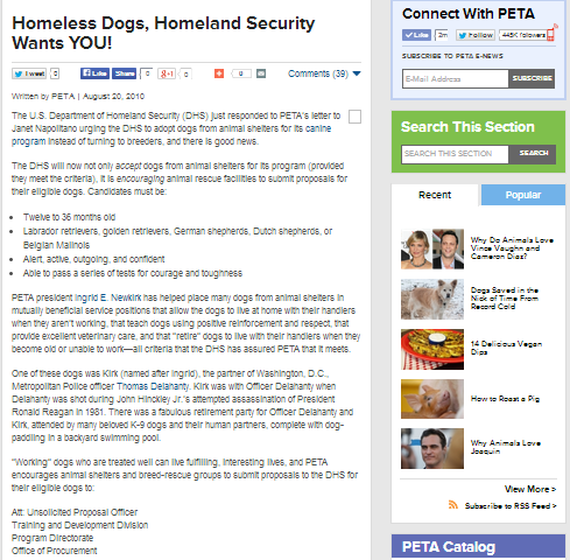 Click on Image to Read Entire Article
Click on Image to Read Entire Article
In 2009, when PETA petitioned the USA Network to cancel its planned coverage of the Westminster dog show, dog show enthusiasts responded with allegations that the animal rights organization means to eradicate "pet ownership" altogether, rather than allow animals to be "enslaved" by humans for any purpose.
L.A. Unleashed covered the Westminster/PETA controversy extensively, taking notice of dozens of comments from readers that they too were concerned that if PETA got its way with Westminster, animal lovers everywhere had better be prepared to kiss their beloved animal companions goodbye. The L.A. Times decided to get to the bottom of the controversy:
L.A. Unleashed covered the Westminster/PETA controversy extensively, taking notice of dozens of comments from readers that they too were concerned that if PETA got its way with Westminster, animal lovers everywhere had better be prepared to kiss their beloved animal companions goodbye. The L.A. Times decided to get to the bottom of the controversy:
"Lots of you shared your worry that PETA wanted to eradicate pets entirely rather than let them be "enslaved" by humans. To get to the bottom of that concern, we talked with PETA's Vice President for Cruelty Investigations, Daphna Nachminovitch. Here's a bit of what we talked about:" - See more at: http://latimesblogs.latimes.com/unleashed/2009/01/when-we-first-r.html
The L.A. Times column "L.A. Unleashed" decided to ask PETA's Vice President of Cruelty Investigations directly about their policy regarding companion animals. It turns out, PETA actually encourages people to adopt animal companions from shelters. In fact, if guardians are able to provide proper care for an animal companion, they should consider adopting two:
Unleashed: "In a perfect world where all of PETA's goals had been achieved, would a dog (I have two rescue mutts) live in my house with me?"
Daphna Nachminovitch: "Yes! I have two rescued mutts, too (adopted from PETA of course). If you are a kind soul and would be one of the people rescuing dogs in trouble –- just as there are always wars, there are always animals in need of kindness! -- please adopt another one."
Now, I was already aware that this was PETA's policy regarding animal companions, so what was REALLY interesting to ME about the interview was Ingrid Newkirk's history of working with the DC Metropolitan Police Department to supply them with shelter dogs for their working dog program:
"PETA's president had a long working relationship with a program to supply police dogs from the DC Animal Shelter to the Metropolitan Police department because they were humanely trained, and enjoyed a home life with their officers. One of the dogs named after her, Kirk, was with an officer who was shot when President Reagan was shot, and he retired with his officer."
Other accounts of the Reagan assassination attempt claim that Kirk, the police dog, was actually home sick that day.
You can read the entire "L.A. Unleashed" piece here: http://latimesblogs.latimes.com/unleashed/2009/01/when-we-first-r.html
You can read the entire "L.A. Unleashed" piece here: http://latimesblogs.latimes.com/unleashed/2009/01/when-we-first-r.html
Ingrid Newkirk isn't in it for the Money

Click on Image to View Entire Document
When "proof" that "PETA Kills Animals" falls away under scrutiny, a lot of PETA's detractors will resort to making wild accusations about PETA's financial practices to shore-up their case against PETA. I encourage everyone to take a look at PETA's financial reports which are easily accesses from their website and various charity websites. In 2012, PETA paid Ingrid Newkirk a whopping $38, 122 last year--her highest salary yet.
Next come the accusations that "PETA spends all their money on advertising." The truth is, PETA spends $0.00 on advertising. Interestingly, by selling ad space in their quarterly newsletter, PETA generates revenue from advertising. PETA made $43,107 last year from selling advertising.
Another popular allegation is that PETA spends an inordinate amount of money paying celebrities to participate in their campaigns. There is zero indication that PETA pays celebrities at all, let alone exorbitant fees.
Conversely, out of the No Kill Law and Advocacy Center's total 2012 revenue of $238,584, Nathan Winograd paid himself $60,000, over one-quarter of his organization's entire budget for the year. Another $15,282 was spent on paying payroll taxes on his own salary. Another quarter of the No Kill Law and Advocacy Center's budget ($53,944) was spent on "program expenses." The "No Kill Law and Advocacy Center dipped well into its 2011 surplus of $138,743, just to stay afloat last year. According to the IRS 990, not one penny of the No Kill Advocacy Center's budget went to directly helping animals. The organization started this year off with only $29,551 in the bank. Nathan Winograd's going to have to get to work and fast, if he's going to "earn" that $60,000 salary this year.
Next come the accusations that "PETA spends all their money on advertising." The truth is, PETA spends $0.00 on advertising. Interestingly, by selling ad space in their quarterly newsletter, PETA generates revenue from advertising. PETA made $43,107 last year from selling advertising.
Another popular allegation is that PETA spends an inordinate amount of money paying celebrities to participate in their campaigns. There is zero indication that PETA pays celebrities at all, let alone exorbitant fees.
Conversely, out of the No Kill Law and Advocacy Center's total 2012 revenue of $238,584, Nathan Winograd paid himself $60,000, over one-quarter of his organization's entire budget for the year. Another $15,282 was spent on paying payroll taxes on his own salary. Another quarter of the No Kill Law and Advocacy Center's budget ($53,944) was spent on "program expenses." The "No Kill Law and Advocacy Center dipped well into its 2011 surplus of $138,743, just to stay afloat last year. According to the IRS 990, not one penny of the No Kill Advocacy Center's budget went to directly helping animals. The organization started this year off with only $29,551 in the bank. Nathan Winograd's going to have to get to work and fast, if he's going to "earn" that $60,000 salary this year.
PETA's Official Stance on Pit Bulls and Breed-Specific Legislation (And a Healthy Dose of Commentary from the Writer)
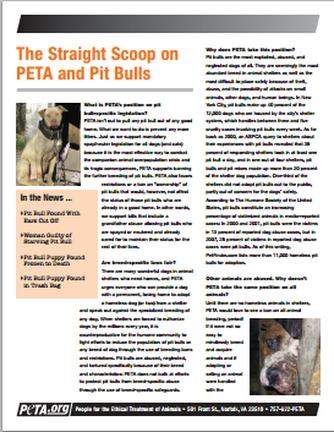
Click to Read
"By fighting lifesaving shelter reform, PETA and other regressive animal organizations are effectively aiding and abetting the commercial breeding of animals. By arguing that all pit bulls in shelters should be killed, PETA and others are necessarily driving those who aim to adopt a pit bull to breeders who will gladly meet the demand."~Ryan Clinton, Lawyer and "No-Kill" Activist
By "fighting shelter reform," Ryan Clinton means "opposing the current 'No-Kill' legislation." Opposing legislation that limits rescue oversight, or causes dangerous shelter overcrowding has no bearing on how many animals are generated by breeders. Ryan Clinton insultingly thinks you can't tell an apple from an orange, and that he can benefit from that somehow. You can learn more about which aspects of the current "No-Kill" legislative models PETA opposes and why here. Otherwise, let's start with why pit bulls were bred in the first place, and why folks like Ryan Clinton exploit them to gather opposition to PETA.
Below is an excerpt from a well-researched blog piece on the curious origins of the "Nanny Dog" notion, a concept perpetuated by pit bull breeders and those who endeavor to "save" pit bulls and their ilk from the depths of ill-repute. You can read the full blog piece here, and I strongly recommend that you do.
"The old lovers of the bulldog found to their dismay that sometimes a terrier, with only quickness and a pair of punishing jaws to recommend him, would kill a bulldog while the latter was merely hanging on. The bulldog would be brave to the death of course, and would withstand pain that the terrier would never endure, but that was poor consolation when the terrier had killed the dog.
"The dog fighters were, however, as persevering a set of men as were the bull baiters, and they set to work to remodel their favorites for their new occupation. They began to cross their bulldogs with the white English terrier, a breed now practically extinct, but the same in every respect, save color, as the modern Manchester or black-and-tan. The progeny was named the bull terrier, the greatest fighting machine, pound for pound, on four legs. The bull terrier had the courage of the bulldog and the jaws and quickness of the white terrier. Moreover, he has the terrier's way of fighting. He does not simply take a hold and stay there. He takes a hold and begins to eat his way through and tear and worry. If his first hold doesn't suit, he takes another. If he gets his adversary by the throat, he will tear out the throat in a minute or so and end the battle.' There is perhaps no more beautiful illustration of the results of artificial selection than is provided in the history of the bulldog. It is a wonderful example of patient and skillful breeding for an object that is not wholly ignoble."~New York Times, Circa 1908, as quoted in Eric Hoffer's essay "The Truth About Pit Bulls"
No matter where you land on the subject of pit bulls and breed-specific legislation, I hope we can agree that the issue deserves honest discussion. An inordinate number of pit bulls enter America's shelters every day, the majority of whom are euthanized either because they remain unclaimed, or as a matter of shelter policy. Others lie at the end of chains, because they've either become disenfranchised from their human family members or because they were purchased as lawn ornaments in the first place. And many pit bulls who do find their way into good homes are still at risk for homelessness, should their guardians every need to rent a home, or venture into new communities.
"'We're actually very pet-friendly,' said Performance Properties president Nori Falconeri, whose company rents apartments and single-family homes. 'But just through experience through the years, with some of the problems that have arisen from allowing certain breeds, we've had to disallow them. It's that simple.'
"Just two weeks ago, a tenant's pit-bull mix (which the property permitted) killed another dog. The company now faces a lawsuit and is tightening its restrictions on 'questionable" breed mixes, she said.'~As Reported by the Oregonian
And of course, this presents an enormous problem with regards to finding homes for pit bulls who enter shelters. You can learn more about why apartments and types of communities restrict pit bulls here. Unfortunately, the problem for pit bulls doesn't stop there. When shelters implement no-adoption policies for pit bulls, or when the shelters that do endeavor to find permanent adoptive homes for Pit bulls encounter animals that have behavior issues rendering them unsuitable for adoption, the dilemma of what to do with them next comes creaming to the forefront. Contrary to the current "No-Kill" wisdom, siphoning iffy and even dangerous dogs off to "rescues" isn't always in the dogs' best interests. You can read an interesting blog about why rescues and fosters, even good ones, don't always come forward to help dogs with iffy reputations here. The following is one accounting of the events surrounding the seizure of nearly 300 animals from a respected pit bull "rescue":
"While the rescuers believed they were there to seize at most 100 dogs, a quick look at the Spindletop facilities revealed that that number was triple what they had expected. In all, 298 dogs were confiscated from the property. 'Many of them are in cramped cages — so cramped they can’t even turn around,' HSUS Texas State Director Katie Jarl described to KHOU. In fact, during a walkthrough of the Spindletop facility, many of the dogs’ cages appeared to be wired and even welded shut. 'Many of their cages have been shut for so long, we know these dogs haven’t ever been out of their cages,' Jarl explained."~As reported by Dog Time
"Pottawatomie County, OK - Just outside of Shawnee city boundaries, Dana Dethrow runs what she calls a 'pit bull rescue shelter,' where she keeps 15 pit bulls chained up 24 hours a day. Dethrow told Fox 25 News, 'I do not breed the dogs.' But the question of whether or not her 15 pit bulls had been spay or neutered did not come up. Dethrow's neighbors, who would not appear on camera out of fear, feel they are the ones that need to be rescued from this dangerous situation. Dethrow does not live on the property with the pit bulls. She lives inside of Shawnee. Last week one of her chained pit bulls broke free and attacked a child."~As Reported by Dogs Bite.Org
So what's the solution? Banning pit bull breeding and and restricting ownership? Continuing to promote the adoption of pit bulls into a society that doesn't want to live next door to them? Keeping them caged in shelters into perpetuity, or funneling them to rescues, and hoping to God that their needs will be appropriately met? It has been said that social change is a generational phenomenon that occurs over the span of three generations. Is it really appropriate that we focus our resources on improving the reputations of pit bulls, while they're currently being bred to die in shelters, and may continue to be until our children's children solve the problem? This is PETA's official stance on pit bulls and breed-specific legislation:
"PETA isn't out to pull any pit bull out of any good home. What we want to do is prevent any more litters. Just as we support mandatory spay/neuter legislation for all dogs (and cats) because it is the most effective way to combat the companion animal overpopulation crisis and its tragic consequences, PETA supports banning the further breeding of pit bulls. PETA also favors restrictions or a ban on “ownership” of pit bulls that would, however, not affect the status of those pit bulls who are already in a good home. In other words, we support bills that include a grandfather clause allowing pit bulls who are spayed or neutered and already cared for to maintain their status for the rest of their lives."
Clearly this is a complex issue, and one that Ryan Clinton's stab at drumming-up membership to the "Why We Hate PETA Club" doesn't even come close to addressing. And yes, this writer excluded the worst by far of all the pit bull plights from this discussion, and that is their exploitation for "sport." I am a coward in that respect. I simply couldn't bring myself to foray down that avenue of research. If you love pit bulls, good. Love them enough to put their needs first.
By "fighting shelter reform," Ryan Clinton means "opposing the current 'No-Kill' legislation." Opposing legislation that limits rescue oversight, or causes dangerous shelter overcrowding has no bearing on how many animals are generated by breeders. Ryan Clinton insultingly thinks you can't tell an apple from an orange, and that he can benefit from that somehow. You can learn more about which aspects of the current "No-Kill" legislative models PETA opposes and why here. Otherwise, let's start with why pit bulls were bred in the first place, and why folks like Ryan Clinton exploit them to gather opposition to PETA.
Below is an excerpt from a well-researched blog piece on the curious origins of the "Nanny Dog" notion, a concept perpetuated by pit bull breeders and those who endeavor to "save" pit bulls and their ilk from the depths of ill-repute. You can read the full blog piece here, and I strongly recommend that you do.
"The old lovers of the bulldog found to their dismay that sometimes a terrier, with only quickness and a pair of punishing jaws to recommend him, would kill a bulldog while the latter was merely hanging on. The bulldog would be brave to the death of course, and would withstand pain that the terrier would never endure, but that was poor consolation when the terrier had killed the dog.
"The dog fighters were, however, as persevering a set of men as were the bull baiters, and they set to work to remodel their favorites for their new occupation. They began to cross their bulldogs with the white English terrier, a breed now practically extinct, but the same in every respect, save color, as the modern Manchester or black-and-tan. The progeny was named the bull terrier, the greatest fighting machine, pound for pound, on four legs. The bull terrier had the courage of the bulldog and the jaws and quickness of the white terrier. Moreover, he has the terrier's way of fighting. He does not simply take a hold and stay there. He takes a hold and begins to eat his way through and tear and worry. If his first hold doesn't suit, he takes another. If he gets his adversary by the throat, he will tear out the throat in a minute or so and end the battle.' There is perhaps no more beautiful illustration of the results of artificial selection than is provided in the history of the bulldog. It is a wonderful example of patient and skillful breeding for an object that is not wholly ignoble."~New York Times, Circa 1908, as quoted in Eric Hoffer's essay "The Truth About Pit Bulls"
No matter where you land on the subject of pit bulls and breed-specific legislation, I hope we can agree that the issue deserves honest discussion. An inordinate number of pit bulls enter America's shelters every day, the majority of whom are euthanized either because they remain unclaimed, or as a matter of shelter policy. Others lie at the end of chains, because they've either become disenfranchised from their human family members or because they were purchased as lawn ornaments in the first place. And many pit bulls who do find their way into good homes are still at risk for homelessness, should their guardians every need to rent a home, or venture into new communities.
"'We're actually very pet-friendly,' said Performance Properties president Nori Falconeri, whose company rents apartments and single-family homes. 'But just through experience through the years, with some of the problems that have arisen from allowing certain breeds, we've had to disallow them. It's that simple.'
"Just two weeks ago, a tenant's pit-bull mix (which the property permitted) killed another dog. The company now faces a lawsuit and is tightening its restrictions on 'questionable" breed mixes, she said.'~As Reported by the Oregonian
And of course, this presents an enormous problem with regards to finding homes for pit bulls who enter shelters. You can learn more about why apartments and types of communities restrict pit bulls here. Unfortunately, the problem for pit bulls doesn't stop there. When shelters implement no-adoption policies for pit bulls, or when the shelters that do endeavor to find permanent adoptive homes for Pit bulls encounter animals that have behavior issues rendering them unsuitable for adoption, the dilemma of what to do with them next comes creaming to the forefront. Contrary to the current "No-Kill" wisdom, siphoning iffy and even dangerous dogs off to "rescues" isn't always in the dogs' best interests. You can read an interesting blog about why rescues and fosters, even good ones, don't always come forward to help dogs with iffy reputations here. The following is one accounting of the events surrounding the seizure of nearly 300 animals from a respected pit bull "rescue":
"While the rescuers believed they were there to seize at most 100 dogs, a quick look at the Spindletop facilities revealed that that number was triple what they had expected. In all, 298 dogs were confiscated from the property. 'Many of them are in cramped cages — so cramped they can’t even turn around,' HSUS Texas State Director Katie Jarl described to KHOU. In fact, during a walkthrough of the Spindletop facility, many of the dogs’ cages appeared to be wired and even welded shut. 'Many of their cages have been shut for so long, we know these dogs haven’t ever been out of their cages,' Jarl explained."~As reported by Dog Time
"Pottawatomie County, OK - Just outside of Shawnee city boundaries, Dana Dethrow runs what she calls a 'pit bull rescue shelter,' where she keeps 15 pit bulls chained up 24 hours a day. Dethrow told Fox 25 News, 'I do not breed the dogs.' But the question of whether or not her 15 pit bulls had been spay or neutered did not come up. Dethrow's neighbors, who would not appear on camera out of fear, feel they are the ones that need to be rescued from this dangerous situation. Dethrow does not live on the property with the pit bulls. She lives inside of Shawnee. Last week one of her chained pit bulls broke free and attacked a child."~As Reported by Dogs Bite.Org
So what's the solution? Banning pit bull breeding and and restricting ownership? Continuing to promote the adoption of pit bulls into a society that doesn't want to live next door to them? Keeping them caged in shelters into perpetuity, or funneling them to rescues, and hoping to God that their needs will be appropriately met? It has been said that social change is a generational phenomenon that occurs over the span of three generations. Is it really appropriate that we focus our resources on improving the reputations of pit bulls, while they're currently being bred to die in shelters, and may continue to be until our children's children solve the problem? This is PETA's official stance on pit bulls and breed-specific legislation:
"PETA isn't out to pull any pit bull out of any good home. What we want to do is prevent any more litters. Just as we support mandatory spay/neuter legislation for all dogs (and cats) because it is the most effective way to combat the companion animal overpopulation crisis and its tragic consequences, PETA supports banning the further breeding of pit bulls. PETA also favors restrictions or a ban on “ownership” of pit bulls that would, however, not affect the status of those pit bulls who are already in a good home. In other words, we support bills that include a grandfather clause allowing pit bulls who are spayed or neutered and already cared for to maintain their status for the rest of their lives."
Clearly this is a complex issue, and one that Ryan Clinton's stab at drumming-up membership to the "Why We Hate PETA Club" doesn't even come close to addressing. And yes, this writer excluded the worst by far of all the pit bull plights from this discussion, and that is their exploitation for "sport." I am a coward in that respect. I simply couldn't bring myself to foray down that avenue of research. If you love pit bulls, good. Love them enough to put their needs first.
The Problem with Legalizing the Abandonment of Cats
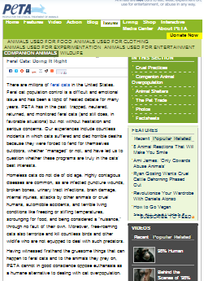
Click to View
"There are millions of feral cats in the United States. Feral cat population control is a difficult and emotional issue and has been a topic of heated debate for many years. PETA has in the past trapped, neutered, returned, and monitored feral cats (and still does, in favorable situations) but not without hesitation and serious concerns. Our experiences include countless incidents in which cats suffered and died horrible deaths because they were forced to fend for themselves outdoors, whether “managed” or not, and have led us to question whether these programs are truly in the cats’ best interests."~People for the Ethical Treatment of Animals
And, of course, there's good reason to question whether feral cat colonies are in cats' best interests.
"Years ago in Philly I helped care for a small feral cat colony that had sprung up in a construction site across from the house of one of my dog walking clients. Not having much experience with ferals, I reached out for help and found a woman who would help me trap the cats. The construction site was rapidly turning over into new luxury homes. The cats couldn't stay there, so we had no choice but to remove them. The short story is that we trapped the kittens and I adopted them out. But the adult females were a different story. They were truly feral and suffering in the home of the trapper, an experienced feral handler. We came to the agreement that cats were miserable in her house, despite her best efforts, and we had to do something. We couldn't return them to their former “home” – it was now the foundation of a townhouse. We couldn't take them to the city shelter. They would be caged, stressed, then killed for being feral. So we looked into a sanctuary and found one in western PA.
"We were as diligent as we thought was necessary about checking out a place that was a day’s drive away. I had multiple phone calls with the owner. We spoke to other people who had transported cats out there and seen it in person and they swore it was a safe, clean, enriching place for cats to live out their lives, if they were not adopted out. Desperate not to put these two cats to sleep (one of them now named 'Dolce' after me), we arranged for a volunteer to drive them out to the sanctuary. Those of you in animal welfare might be wondering: Yes, it turned out to be the infamous Tiger Ranch. A few years after we brought our two feral cats there, authorities raided this sanctuary and found dead cats and neglected animals everywhere."~notesfromadogwalker on July 21, 2012
While most of us would be horrified at the prospect of legalizing the relegating of dogs, or even domestic rabbits to a life of homelessness on the streets, a lot of people are chirping up in favor of legalizing--even mandating the re-abandoning of feral cats, should shelters get them , though cats are no better-equipped to take on America's mean streets than dogs or domestic rabbits. And the alternatives? Feel-goody sanctuaries that can quickly find themselves out of their depth? Feel-shitty euthanasia? The issue is fraught with concerns, not unlike the concerns surrounding the issue of "saving" pit bulls:
"From people like me: everyday people who 'rescue' animals and desperately reach out for help once they realize they’re in over their heads. From no-kill rescue groups and shelters that don’t want to euthanize pets they've taken into their care, but have run out space or do not have resources for long-term housing. From families that for whatever reason cannot care for their pets.
"We all keep pushing down the chain. Individuals reach out to shelters, shelters plead with rescues to pull dogs, rescues can’t place all the dogs, so they board hard-to-place dogs in sanctuaries.
"We’re all begging for someone else to give us the happy ending we so desperately want for the animals we love. If people deny us, we lash out that no one will help. If a shelter isn't no-kill, we refuse to donate to them. We keep pushing and pushing until someone will take this painful, difficult situation off of our doorstep.
"We all push until we find sanctuaries who say yes.
"Can you blame them for saying yes? How long could you say no for, when the world is banging down your door to help just 'one more' innocent animal? The pressure on these people to say 'yes' is enormous. No doubt about it – they should be responsible and limit their intakes and their behavior, in the case of Tiger Ranch and other similar scenarios, is criminal. But in reality their failure to be responsible comes at the end of a long line of people who failed to make responsible choices. We can’t turn the spotlight on their mismanagement and recklessness, without turning it back on ourselves.
"We are so invested in the misunderstood idea of 'no kill' that we will do anything to postpone the death of the animals we care for. And so the dogs and cats get shipped out across the country or driven across the state, packed with their paperwork and all of our hopes that there really is a happy ending out there for every single animal. And then they wait. In kennels and cages for months, then years. 23 to 24 hours a day in their kennels. No family to call their own. Warehoused and tucked away from the world."~notesfromadogwalker on July 21, 2012
And, of course, there's good reason to question whether feral cat colonies are in cats' best interests.
"Years ago in Philly I helped care for a small feral cat colony that had sprung up in a construction site across from the house of one of my dog walking clients. Not having much experience with ferals, I reached out for help and found a woman who would help me trap the cats. The construction site was rapidly turning over into new luxury homes. The cats couldn't stay there, so we had no choice but to remove them. The short story is that we trapped the kittens and I adopted them out. But the adult females were a different story. They were truly feral and suffering in the home of the trapper, an experienced feral handler. We came to the agreement that cats were miserable in her house, despite her best efforts, and we had to do something. We couldn't return them to their former “home” – it was now the foundation of a townhouse. We couldn't take them to the city shelter. They would be caged, stressed, then killed for being feral. So we looked into a sanctuary and found one in western PA.
"We were as diligent as we thought was necessary about checking out a place that was a day’s drive away. I had multiple phone calls with the owner. We spoke to other people who had transported cats out there and seen it in person and they swore it was a safe, clean, enriching place for cats to live out their lives, if they were not adopted out. Desperate not to put these two cats to sleep (one of them now named 'Dolce' after me), we arranged for a volunteer to drive them out to the sanctuary. Those of you in animal welfare might be wondering: Yes, it turned out to be the infamous Tiger Ranch. A few years after we brought our two feral cats there, authorities raided this sanctuary and found dead cats and neglected animals everywhere."~notesfromadogwalker on July 21, 2012
While most of us would be horrified at the prospect of legalizing the relegating of dogs, or even domestic rabbits to a life of homelessness on the streets, a lot of people are chirping up in favor of legalizing--even mandating the re-abandoning of feral cats, should shelters get them , though cats are no better-equipped to take on America's mean streets than dogs or domestic rabbits. And the alternatives? Feel-goody sanctuaries that can quickly find themselves out of their depth? Feel-shitty euthanasia? The issue is fraught with concerns, not unlike the concerns surrounding the issue of "saving" pit bulls:
"From people like me: everyday people who 'rescue' animals and desperately reach out for help once they realize they’re in over their heads. From no-kill rescue groups and shelters that don’t want to euthanize pets they've taken into their care, but have run out space or do not have resources for long-term housing. From families that for whatever reason cannot care for their pets.
"We all keep pushing down the chain. Individuals reach out to shelters, shelters plead with rescues to pull dogs, rescues can’t place all the dogs, so they board hard-to-place dogs in sanctuaries.
"We’re all begging for someone else to give us the happy ending we so desperately want for the animals we love. If people deny us, we lash out that no one will help. If a shelter isn't no-kill, we refuse to donate to them. We keep pushing and pushing until someone will take this painful, difficult situation off of our doorstep.
"We all push until we find sanctuaries who say yes.
"Can you blame them for saying yes? How long could you say no for, when the world is banging down your door to help just 'one more' innocent animal? The pressure on these people to say 'yes' is enormous. No doubt about it – they should be responsible and limit their intakes and their behavior, in the case of Tiger Ranch and other similar scenarios, is criminal. But in reality their failure to be responsible comes at the end of a long line of people who failed to make responsible choices. We can’t turn the spotlight on their mismanagement and recklessness, without turning it back on ourselves.
"We are so invested in the misunderstood idea of 'no kill' that we will do anything to postpone the death of the animals we care for. And so the dogs and cats get shipped out across the country or driven across the state, packed with their paperwork and all of our hopes that there really is a happy ending out there for every single animal. And then they wait. In kennels and cages for months, then years. 23 to 24 hours a day in their kennels. No family to call their own. Warehoused and tucked away from the world."~notesfromadogwalker on July 21, 2012
The Great Story-Tellers
"The great enemy of the truth is very often not the lie, deliberate, contrived and dishonest, but the myth, persistent, persuasive and unrealistic."~John. F. Kennedy
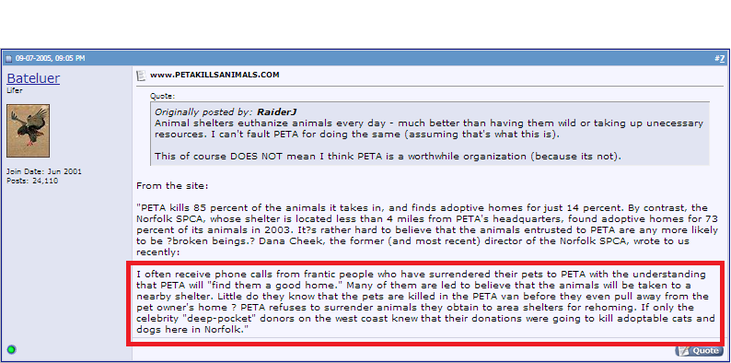
When people tell you that they can "prove"that PETA euthanizes adoptable animals, they'll often wheel this famous "PETA Kills Animals" quote attributed to Dana Cheek out of its dusty shed. Dana Cheek is the former Director of the Norfolk SPCA, a flailing and strife-rifed "No-Kill" shelter in Norfolk Virginia.
This quote weaves quite a tapestry of disinformation, borrowing many tattered threads from the Center for Consumer Freedom's version of the North Carolina incident. Thankfully, Virginia's State Veterinarian, Dr. Dan Kovich, DVM, MPH, was kind enough to go on the record as stating that to the best of his recollection, his office has never received a complaint that PETA misrepresented their services in any way, proving that Ms. Cheek's allegations have absolutely zero voracity.
It seems that Dana Cheek is a fairly famous rabblerouser, at least in the realm of "No-Kill" animal sheltering. After leaving as Director of the Norfolk SPCA, Ms. Cheek was hired but then fired by the Heritage Humane Society under allegations that she was the subject of "a host of complaints, including concern over firing a longtime volunteer coordinator, treatment of animals that appeared to be in distress, presentation of dangerous animals as adoptable, the type of food given to animals and management style."
"The Old Man and the Bunny" Anecdote
"A former PETA employee spoke of one particular incident that burned into her mind forever: A teary-eyed man showed up at PETA headquarters one day with his beloved pet rabbit. The man had grown old and sick and was no longer able to care properly for his friend. He supplied a cage, bed, toys, and even vet records for this pet. He was assured by PETA workers that they would take 'good care' of his rabbit and find him a home. The man left distraught but no doubt believing that his friend would be able to live out the rest of his life in a loving, compassionate home... PETA workers carried him to the 'death house' immediately and ended his life." As told by Douglas Anthony Cooper
If you're trying to make that case, the necessity for anecdotal "evidence" that PETA euthanizes adoptable animals is pretty clear. There are no other means of shoring-up that terrible claim. With regards to animal releasing agencies, the state of Virginia considers each of the three methods of "disposition," adoption, transfer, and euthanasia, to be equal under the law. Meaning, the state doesn't require animal releasing agencies to justify one method of disposition over another. Virginia has no state-wide legal criteria for defining "adoptability," so animal releasing agencies are not required to record or report such determinations to the state. The State Veterinarian simply doesn't collect that data. And if the State Veterinarian doesn't know how many adoptable animals are euthanized in Virginia's shelters and pounds, no one does. Not the Center for Consumer Freedom, not Nathan Winograd, not Douglas Anthony Cooper, and certainly not Dana Cheek.
This quote weaves quite a tapestry of disinformation, borrowing many tattered threads from the Center for Consumer Freedom's version of the North Carolina incident. Thankfully, Virginia's State Veterinarian, Dr. Dan Kovich, DVM, MPH, was kind enough to go on the record as stating that to the best of his recollection, his office has never received a complaint that PETA misrepresented their services in any way, proving that Ms. Cheek's allegations have absolutely zero voracity.
It seems that Dana Cheek is a fairly famous rabblerouser, at least in the realm of "No-Kill" animal sheltering. After leaving as Director of the Norfolk SPCA, Ms. Cheek was hired but then fired by the Heritage Humane Society under allegations that she was the subject of "a host of complaints, including concern over firing a longtime volunteer coordinator, treatment of animals that appeared to be in distress, presentation of dangerous animals as adoptable, the type of food given to animals and management style."
"The Old Man and the Bunny" Anecdote
"A former PETA employee spoke of one particular incident that burned into her mind forever: A teary-eyed man showed up at PETA headquarters one day with his beloved pet rabbit. The man had grown old and sick and was no longer able to care properly for his friend. He supplied a cage, bed, toys, and even vet records for this pet. He was assured by PETA workers that they would take 'good care' of his rabbit and find him a home. The man left distraught but no doubt believing that his friend would be able to live out the rest of his life in a loving, compassionate home... PETA workers carried him to the 'death house' immediately and ended his life." As told by Douglas Anthony Cooper
If you're trying to make that case, the necessity for anecdotal "evidence" that PETA euthanizes adoptable animals is pretty clear. There are no other means of shoring-up that terrible claim. With regards to animal releasing agencies, the state of Virginia considers each of the three methods of "disposition," adoption, transfer, and euthanasia, to be equal under the law. Meaning, the state doesn't require animal releasing agencies to justify one method of disposition over another. Virginia has no state-wide legal criteria for defining "adoptability," so animal releasing agencies are not required to record or report such determinations to the state. The State Veterinarian simply doesn't collect that data. And if the State Veterinarian doesn't know how many adoptable animals are euthanized in Virginia's shelters and pounds, no one does. Not the Center for Consumer Freedom, not Nathan Winograd, not Douglas Anthony Cooper, and certainly not Dana Cheek.
- View more crazy-ass anti-PETA anecdotes here.
The Curious Case of "forever fantasy"

In March of 2013, an anonymous blogger posted her own malicious anti-PETA anecdote on the social media website, "tumblr." Below is an excerpt of that anecdote, and the subsequent apologies issued by the blogger in response to the rabid shit-storm generated by her unfortunate allegations:
"So for those of you may or may not know the organization PETA is people against animal cruelty. Well let me tell you a story that I just found out today.
"Our dog Boulder is a show dog and he was at a show a few weeks or so ago. PETA was also there and they were protesting how dog shows are inhumane.
"So what did they fucking do? They let all/most of the dogs out of their kennels and put rat poison inside the kennels.
"Boulder got sick after the show and as they were doing tests and everything they found the rat poison in his system. PETA killed my dog."
The malicious post generated 37,108 comments and "shares" on tumblr. References to this regrettable post were shared in part and parcel on PETA's Facebook fan page. Some of those comments were made by folks who claimed to have personal knowledge of the aforementioned fantasy incident. Within hours, "forever fantasy" issued the following retractions. The first retraction generated just 19 comments and "shares" on "tumblr." The second one, 140 comments and "shares."
"Hey guys I just wanted to apologize about my post earlier about Boulder which I know is very sad. I just want to apologize to PETA and say I’m sorry for the things I said about them. I never meant for this to get so out of hand. I would just like to take back what I said. I’m sorry. The official apology is on my page I am very sorry for all that has happened, and I made a mistake."~"forever fantasy"
Followed by a slightly more "lawyered-up" version, containing the all-important admission that she had made the whole thing up:
"I am writing this apology concerning the false Tumblr post that I made on March 24, 2013. I retract all statements that I made in the post, every one of which was utterly false and fabricated. There was no basis whatsoever for any statement I made against PETA. I am very sorry and apologize for everything that I said. To learn more about PETA’s programs, go to peta.org."~"forever fantasy"
"So for those of you may or may not know the organization PETA is people against animal cruelty. Well let me tell you a story that I just found out today.
"Our dog Boulder is a show dog and he was at a show a few weeks or so ago. PETA was also there and they were protesting how dog shows are inhumane.
"So what did they fucking do? They let all/most of the dogs out of their kennels and put rat poison inside the kennels.
"Boulder got sick after the show and as they were doing tests and everything they found the rat poison in his system. PETA killed my dog."
The malicious post generated 37,108 comments and "shares" on tumblr. References to this regrettable post were shared in part and parcel on PETA's Facebook fan page. Some of those comments were made by folks who claimed to have personal knowledge of the aforementioned fantasy incident. Within hours, "forever fantasy" issued the following retractions. The first retraction generated just 19 comments and "shares" on "tumblr." The second one, 140 comments and "shares."
"Hey guys I just wanted to apologize about my post earlier about Boulder which I know is very sad. I just want to apologize to PETA and say I’m sorry for the things I said about them. I never meant for this to get so out of hand. I would just like to take back what I said. I’m sorry. The official apology is on my page I am very sorry for all that has happened, and I made a mistake."~"forever fantasy"
Followed by a slightly more "lawyered-up" version, containing the all-important admission that she had made the whole thing up:
"I am writing this apology concerning the false Tumblr post that I made on March 24, 2013. I retract all statements that I made in the post, every one of which was utterly false and fabricated. There was no basis whatsoever for any statement I made against PETA. I am very sorry and apologize for everything that I said. To learn more about PETA’s programs, go to peta.org."~"forever fantasy"
More of the Shame
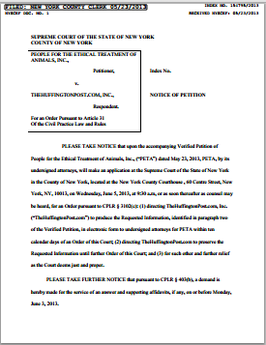
Click to View
On May 23, 2013, pursuant to initiating defamation litigation, PETA filed a document with the New York Supreme Court petitioning Huffington Post to release any and all identifying information pertaining to three individuals who made several, very serious allegations against PETA in the comment section of Nathan Winograd's recent anti-PETA Huffington Post blog entry. Below are excerpts from the aforementioned court documents:
"On April 5, 2013, at 11:59 a.m., Jane Doe 1 published the following comment on
TheHuffingtonPost.com, under the user name “Lucy Van Pelt,” in response to the April 2 blog:6
"[PETA] want[s] the 'shelter' status so that they are able to purchase all the poison
to kill healthy and treatable animals that their little black hearts desire! When they
are criticized (rightly so) for not actually providing any sort of 'shelter' then they
try to deny being a shelter. Let’s be clear here: They [sic] want the Shelter [sic]
status so that they can KILL ILLEGALLY [sic]. Not so they can actually provide
any sort of shelter to homeless animals."
Another anonymous blogger allegedly posted the following allegation on HuffintonPost.com, as well as many others:
"On April 8, 2013, at approximately 1:15 a.m., John Doe published the following
comment on TheHuffingtonPost.com, under the user name “Eyema Nurde,” in response to the
April 2 blog:
"I volunteered at a local PETA 'shelter' for roughly 6 months a few
years ago. I was trying to impress a girl I was dating who worked 10
there. I witnessed first hand [sic] many of these things and more. I
saw 3 kittens in a cage without food or water & when I went to
feed them I was told 'Don’t bother, they will be put down soon.' I
saw a mother cat, after giving birth to its first kitten, euthanized,
put in a bag and tossed in a freezer. She had not yet finished giving
birth to the other kitten/kittens. I have seen people call in & stop by
looking to adopt cats and/or dogs & be turned away. They were
told 'Sorry, we don’t have any available' all the while there were
several cats, dogs, puppies & kittens sitting in cages awaiting
euthanization [sic]. While I’ll admit I’m no 'animal lover', what I
saw there was #@$&ed [sic] up. Of the 100 or so animals I saw
euthanized I can recall 5 that were unhealthy or old. My last day
there, I stole 2 kittens & took them home with me. They sit here
with me now as I type this, healthy and alive. I broke up with the
girl a week later. (The breakup & the PETA situation were
unrelated)"
A third blogger allegedly made this shocking allegation, among others:
"On April 8, 2013, at 2:42 a.m., Jane Doe 2 published the following comment on
TheHuffingtonPost.com, under the user name 'ambersomerville,' in response to the April 2
blog:13
"PETA self-reports to the state of Virginia their statistics, and they kill virtually
every animal in their care: [link to Virginia Department of Agriculture and
Consumer Services, Online Animal Reporting, People for the Ethical Treatment
of Animals, Reporting Year 2012].
PETA claims that they are a shelter of last resort, that these animals were sick.
However, anecdotal evidence from PETA volunteers belies that claim. People
who wish to adopt from PETA are turned away, even with healthy, adoptable
animals right there: [link to John Doe’s comment].
PETA also strongly supports euthanasia, calling it a compassionate gift.
I consider their views sick and twisted. But the most offensive part is how they
choose to spin it and even lie to keep the money flowing."
I'll be watching these events with great personal interest, and reporting updates as they happen.
"On April 5, 2013, at 11:59 a.m., Jane Doe 1 published the following comment on
TheHuffingtonPost.com, under the user name “Lucy Van Pelt,” in response to the April 2 blog:6
"[PETA] want[s] the 'shelter' status so that they are able to purchase all the poison
to kill healthy and treatable animals that their little black hearts desire! When they
are criticized (rightly so) for not actually providing any sort of 'shelter' then they
try to deny being a shelter. Let’s be clear here: They [sic] want the Shelter [sic]
status so that they can KILL ILLEGALLY [sic]. Not so they can actually provide
any sort of shelter to homeless animals."
Another anonymous blogger allegedly posted the following allegation on HuffintonPost.com, as well as many others:
"On April 8, 2013, at approximately 1:15 a.m., John Doe published the following
comment on TheHuffingtonPost.com, under the user name “Eyema Nurde,” in response to the
April 2 blog:
"I volunteered at a local PETA 'shelter' for roughly 6 months a few
years ago. I was trying to impress a girl I was dating who worked 10
there. I witnessed first hand [sic] many of these things and more. I
saw 3 kittens in a cage without food or water & when I went to
feed them I was told 'Don’t bother, they will be put down soon.' I
saw a mother cat, after giving birth to its first kitten, euthanized,
put in a bag and tossed in a freezer. She had not yet finished giving
birth to the other kitten/kittens. I have seen people call in & stop by
looking to adopt cats and/or dogs & be turned away. They were
told 'Sorry, we don’t have any available' all the while there were
several cats, dogs, puppies & kittens sitting in cages awaiting
euthanization [sic]. While I’ll admit I’m no 'animal lover', what I
saw there was #@$&ed [sic] up. Of the 100 or so animals I saw
euthanized I can recall 5 that were unhealthy or old. My last day
there, I stole 2 kittens & took them home with me. They sit here
with me now as I type this, healthy and alive. I broke up with the
girl a week later. (The breakup & the PETA situation were
unrelated)"
A third blogger allegedly made this shocking allegation, among others:
"On April 8, 2013, at 2:42 a.m., Jane Doe 2 published the following comment on
TheHuffingtonPost.com, under the user name 'ambersomerville,' in response to the April 2
blog:13
"PETA self-reports to the state of Virginia their statistics, and they kill virtually
every animal in their care: [link to Virginia Department of Agriculture and
Consumer Services, Online Animal Reporting, People for the Ethical Treatment
of Animals, Reporting Year 2012].
PETA claims that they are a shelter of last resort, that these animals were sick.
However, anecdotal evidence from PETA volunteers belies that claim. People
who wish to adopt from PETA are turned away, even with healthy, adoptable
animals right there: [link to John Doe’s comment].
PETA also strongly supports euthanasia, calling it a compassionate gift.
I consider their views sick and twisted. But the most offensive part is how they
choose to spin it and even lie to keep the money flowing."
I'll be watching these events with great personal interest, and reporting updates as they happen.
"Lucy Van Pelt" Requests a Clarification
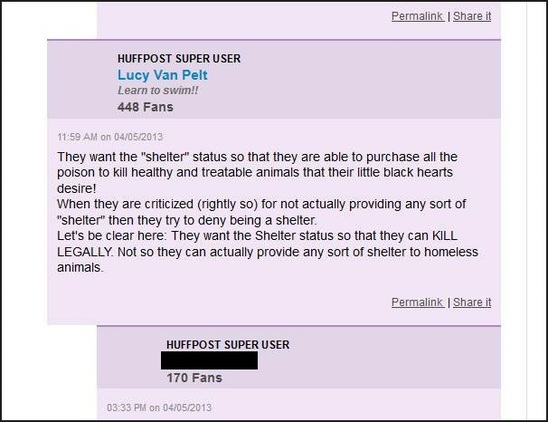
"I’ll be waiting for Ms. Tully to 'update' her page with the truth – but I wont [sic] hold my breath!" "Lucy Van Pelt"
In an interesting turn, the HuffingtonPost.com commenter known as "Lucy Van Pelt" has taken issue with an apparent typo in the court petition, specifically the use of the phrase "They want the Shelter status so that they can KILL ILLEGALLY."
Ms. "Van Pelt" has provided a screen shot as evidence of a mistake within the document, and states that her actual words were: "They want the Shelter status so they can KILL LEGALLY," and has requested the clarification appear on this website.
Ms. "Van Pelt" is seemingly satisfied that the other comments attributed to her in the document were both recorded and reported accurately. The saga continues.
In an interesting turn, the HuffingtonPost.com commenter known as "Lucy Van Pelt" has taken issue with an apparent typo in the court petition, specifically the use of the phrase "They want the Shelter status so that they can KILL ILLEGALLY."
Ms. "Van Pelt" has provided a screen shot as evidence of a mistake within the document, and states that her actual words were: "They want the Shelter status so they can KILL LEGALLY," and has requested the clarification appear on this website.
Ms. "Van Pelt" is seemingly satisfied that the other comments attributed to her in the document were both recorded and reported accurately. The saga continues.
PETA Withdraws the HuffingtonPost.com Petition "With Prejudice"
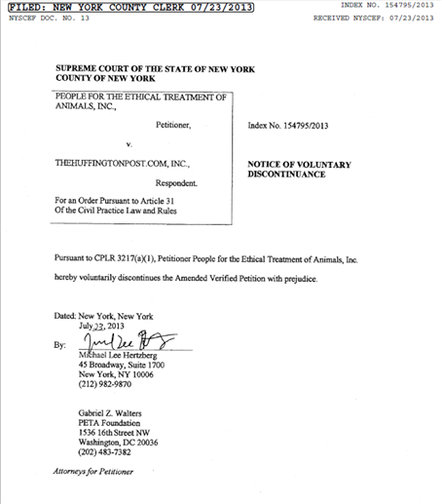
Withdrawing the petition "with prejudice" may indicate that the third HuffingtonPost.com commenter has been otherwise identified. If this is the case, the defamation suits may be entering the next phase. To be continued.
Ingrid Newkirk Speaks About the Events Leading to the Petition

Click to View Article
"Yet on blogs and in their comment sections, people like Nancy and Carol are attacked as "butchers," "killers," and "psychos" who "poison" animals and have "blood on their hands" by detractors who sometimes not only make deriding good people a near-career, but hide, as bullies do, behind the anonymity of made-up names, such as that of a Peanuts cartoon character who posted 375 anti-PETA comments over a period of two weeks. These people even maliciously repeat damning "evidence" that has been disproved in court." Ingrid Newkirk
Most of the press surrounding this petition has focused on the a comparison one of the anonymous commenters made between PETA and Dr. Jack Kevorkian, completely missing the point that in the body of that particular comment, and in another comment made by a "John Doe," were the inferences that the persons making the anonymous comment were something of insiders, a tactic used to lend credibility to their anecdotes.
In the section of the petition where PETA states the facts regarding their practices and the malicious accusation, the following statement is published:
"Upon information and belief, John Doe never volunteered for PETA."
This legal action isn't about silencing trolls, it's about saving PETA's very reputation.
Most of the press surrounding this petition has focused on the a comparison one of the anonymous commenters made between PETA and Dr. Jack Kevorkian, completely missing the point that in the body of that particular comment, and in another comment made by a "John Doe," were the inferences that the persons making the anonymous comment were something of insiders, a tactic used to lend credibility to their anecdotes.
In the section of the petition where PETA states the facts regarding their practices and the malicious accusation, the following statement is published:
"Upon information and belief, John Doe never volunteered for PETA."
This legal action isn't about silencing trolls, it's about saving PETA's very reputation.
HuffingtonPost.com Petition Amended
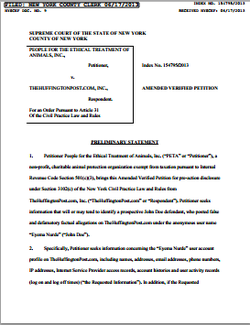
According to this amended petition, PETA has otherwise identified "Jane Doe 1" and "Jane Doe 2," and has dropped them from the HuffingtonPost.com petition. PETA is still petitioning HuffingtonPost.com for "John Doe's" identifying information.
Quote Mining
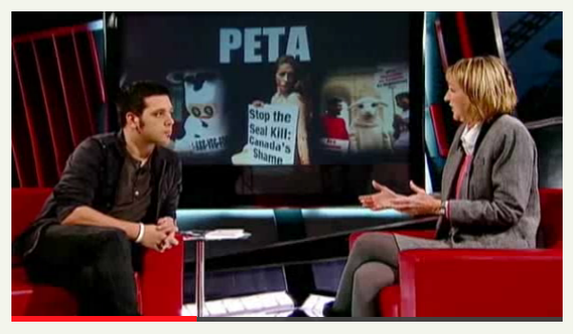
Click to View the Interview
"In a December 2, 2008, interview with George Stroumboulopoulos of the Canadian Broadcasting Corporation, Stroumboulopoulos asks Newkirk: 'Do you euthanize those pets, the adoptable ones, if you get them?' To which Newkirk responds: 'If we get them, if we cannot find a home, absolutely.'" Mined Quote Attributed to Ingrid Newkirk
Taking segments of quotes and using them out of context, or "quote mining," is a fairly well-established practice. Having seen this Ingrid Newkirk quote attributed to a December 2, 2008 interview with George Stroumboulopoulos of the Canadian Broadcasting Corporation referenced many times in articles, blogs and discussions, I wanted to see for myself the context with which Newkirk made the statement, and to see if the quote had been foreshortened for dramatic effect.
After reviewing the tape for George Stroumboulopoulos' December 2, 2008 show and there being no trace of an Ingrid Newkirk interview, I decided to see what Ingrid Newkirk herself had to say about the interview. From her blog site, I followed a link and was able to view the December 1, 2008 interview here. I find it interesting the number of people who refer to the interview having obviously never viewed it. If they had indeed watched George Stroumboulopoulos' December 2, 2008 show, they would've been treated to a lengthy segment with Cheech and Chong, but no Ingrid Newkirk. This is how their conversation actually went:
GS: You have PETA shelters that euthanize lots of animals.
We know that the Center for Consumer Freedom protects the interests of individuals and corporations that collectively confine, concentrate, deprive, and violently disassemble tens of billions of animals every year, so it's obvious that the CCF isn't really concerned that PETA euthanizes an average of five profoundly sick and injured animals in any given twenty-four hour period. And it's been established that Nathan Winograd selectively opposes euthanasia, but I just want to illustrate a point here, using this rather famous Ingrid Newkirk quote to do it. Notice the similarities between these two quotes:
Taking segments of quotes and using them out of context, or "quote mining," is a fairly well-established practice. Having seen this Ingrid Newkirk quote attributed to a December 2, 2008 interview with George Stroumboulopoulos of the Canadian Broadcasting Corporation referenced many times in articles, blogs and discussions, I wanted to see for myself the context with which Newkirk made the statement, and to see if the quote had been foreshortened for dramatic effect.
After reviewing the tape for George Stroumboulopoulos' December 2, 2008 show and there being no trace of an Ingrid Newkirk interview, I decided to see what Ingrid Newkirk herself had to say about the interview. From her blog site, I followed a link and was able to view the December 1, 2008 interview here. I find it interesting the number of people who refer to the interview having obviously never viewed it. If they had indeed watched George Stroumboulopoulos' December 2, 2008 show, they would've been treated to a lengthy segment with Cheech and Chong, but no Ingrid Newkirk. This is how their conversation actually went:
GS: You have PETA shelters that euthanize lots of animals.
- IN: Yes we do.
- IN: Oh, it's hideous. I mean, we're the people who don't kill for food, we don't kill for clothing, you name it, we don't. And yet, we are in a very rural, poor area of Virginia and the border of North Carolina, and we offer free euthanasia services for anyone who has a broken, or aged, or injured animal, and no money for veterinary care.
- IN: Actually, for us, we are usually picking up the worst of the worst, the unsocialized, the ones who have been on a chain their whole lives, they're not even able to think about going into a home. Nobody wants them. So yes, in one way, it would be great if every broken animal, it would be lovely if there was someone who said yes, I'll put in the time and effort, but there are wonderful, cute, fluffy small ones that you can't find homes for, but we don't take in adoptable animals usually, unless we have to, we let them go to shelters where people come through and can choose.
- IN: If we get them and we can't find a home, absolutely. It's the dilemma. It's why I'm so against breeding, and why I say to everybody 'spay and neuter,' and 'don't go to the pet shop, go to the pound.' Save lives, don't take them.
We know that the Center for Consumer Freedom protects the interests of individuals and corporations that collectively confine, concentrate, deprive, and violently disassemble tens of billions of animals every year, so it's obvious that the CCF isn't really concerned that PETA euthanizes an average of five profoundly sick and injured animals in any given twenty-four hour period. And it's been established that Nathan Winograd selectively opposes euthanasia, but I just want to illustrate a point here, using this rather famous Ingrid Newkirk quote to do it. Notice the similarities between these two quotes:
- "In extreme overcrowding situations, we may also be forced to euthanize due to space. In this case, the adoptability of each animal is evaluated carefully and difficult decisions are made. If a healthy animal has been in our care for a long period of time, but has some characteristic that has made adoptability unlikely, we feel it is also inhumane to require the animal to spend their life living in our shelter, despite our best efforts to provide the best care while in our facility."~Josh Cromer, Director of a "90% Club" "No-Kill" Shelter
- "If we get them [healthy, adoptable animals] and we can't find a home, absolutely. It's the dilemma. It's why I'm so against breeding, and why I say to everybody 'spay and neuter,' and 'don't go to the pet shop, go to the pound.' Save lives, don't take them."~Ingrid Newkirk, People for the Ethical Treatment of Animals
The FBI Report on PETA
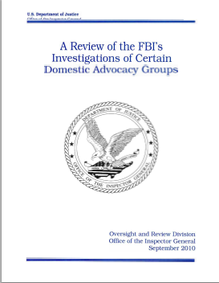
Despite David Martosko's and the Center for Consumer Freedom's best efforts to connect PETA to "terrorists" and their activities, an FBI investigation spanning several years exonerates PETA of engaging in or funding any criminal activity. You can read the Department of Justice's review of the FBI's investigation here. Be warned. It's pretty boring stuff.
"We agree with the FBI Headquarter's conclusion at the third extension that there was not a sufficient factual basis to convert the preliminary inquiry to a full terrorism enterprise investigation, and that it was appropriate after fifteen months of investigation for the FBI to close the case."~US Department of Justice
"We agree with the FBI Headquarter's conclusion at the third extension that there was not a sufficient factual basis to convert the preliminary inquiry to a full terrorism enterprise investigation, and that it was appropriate after fifteen months of investigation for the FBI to close the case."~US Department of Justice
The USDA's Shameful Move

While most of us understand that the primary function of the United States Department of Agriculture (USDA) is to protect agricultural interests, many would find it surprising that the USDA also protects the interests of animal research facilities. Towards this endeavor, the USDA dubiously categorized PETA as a "Domestic Special Interest Terrorist" group in a survey the USDA sent out to animal research facilities.
"PETA is perhaps the most recognized organization in the animal rights movement. They are known for their undercover investigations, and their use of celebrities and outlandish media stunts to draw attention to factory farming, fur, circuses and animal experimentation. Regardless of how you feel about PETA and their tactics, they are a lawful, above-ground, national non-profit. So why in another section of the USDA form, are they listed as a possible answer under “Greatest Threat or Danger. What do you consider the greatest source of danger to your organization and/or fellow workers?” Because they expose what goes on behind closed doors."~Will Potter, Author of "Green is the New Red"
So while the USDOJ and the FBI consider PETA to be a "Domestic Advocacy Group," the people who bring you factory-farming and animal research labs consider PETA to be "Domestic Terrorist Group."
"This clearly reveals that the government has taken to treating PETA as a terrorist group. Now, I've had my many beefs with PETA (hello, pun) before, but this seems beyond the pale. PETA may be controversial, yes, but they are lawful, nonviolent and publicly funded. So how did they end up on a list of the nation's most dangerous domestic threats?"~Bryan Merchant, Treehugger Magazine
What an excellent question. Contemplate that the next time you clean out your bank account paying for a prescription, or make an impassioned plea to your state's officials to prevent the passage of dangerous "ag gag" legislation.
"PETA is perhaps the most recognized organization in the animal rights movement. They are known for their undercover investigations, and their use of celebrities and outlandish media stunts to draw attention to factory farming, fur, circuses and animal experimentation. Regardless of how you feel about PETA and their tactics, they are a lawful, above-ground, national non-profit. So why in another section of the USDA form, are they listed as a possible answer under “Greatest Threat or Danger. What do you consider the greatest source of danger to your organization and/or fellow workers?” Because they expose what goes on behind closed doors."~Will Potter, Author of "Green is the New Red"
So while the USDOJ and the FBI consider PETA to be a "Domestic Advocacy Group," the people who bring you factory-farming and animal research labs consider PETA to be "Domestic Terrorist Group."
"This clearly reveals that the government has taken to treating PETA as a terrorist group. Now, I've had my many beefs with PETA (hello, pun) before, but this seems beyond the pale. PETA may be controversial, yes, but they are lawful, nonviolent and publicly funded. So how did they end up on a list of the nation's most dangerous domestic threats?"~Bryan Merchant, Treehugger Magazine
What an excellent question. Contemplate that the next time you clean out your bank account paying for a prescription, or make an impassioned plea to your state's officials to prevent the passage of dangerous "ag gag" legislation.
